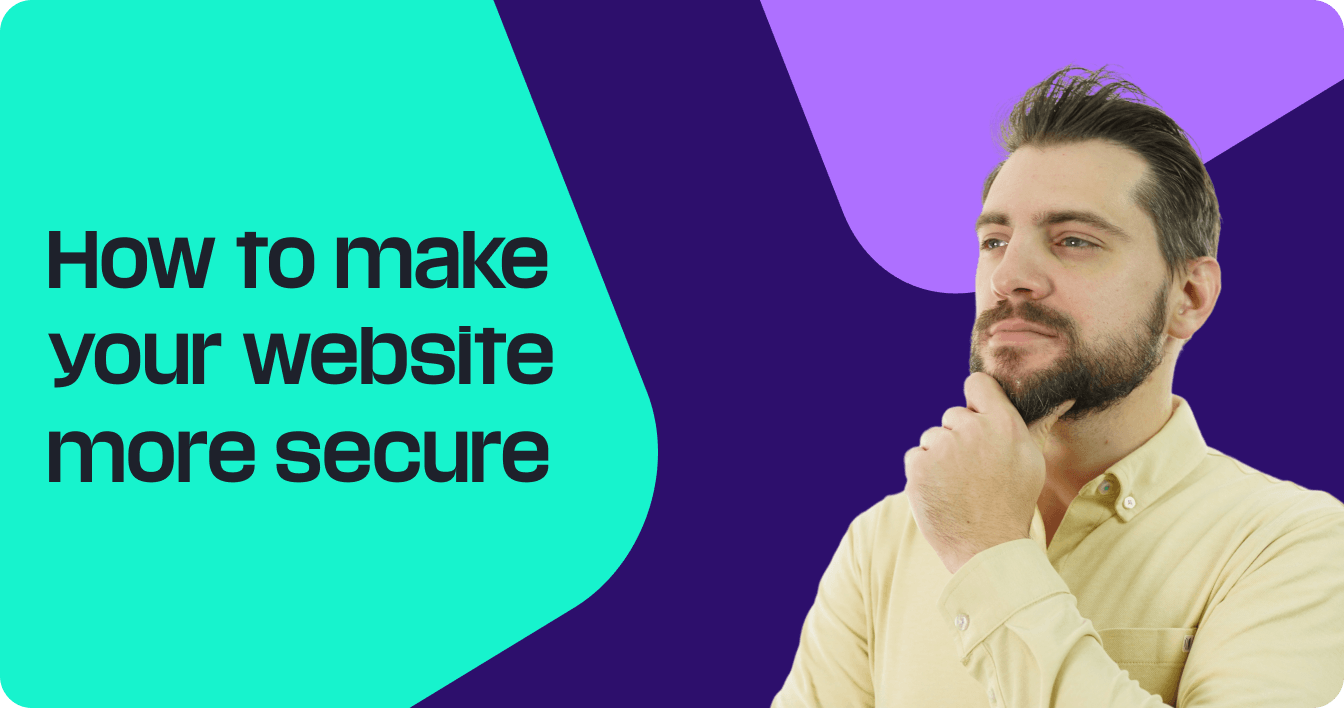If you have a physical office at your business, the odds are good that you make a point of securing it against break-ins. You keep your doors locked outside of office hours, you keep valuable items or documents in a safe place, and you might even hire a security guard.
But are you giving the same treatment to your website? You might be thinking, “It’s just a website. How would someone break into a website? And why would they want to?”
Well, there are numerous reasons someone might hack your site, so it’s critical to secure it against those attacks. How, though? That’s just what we’ll discuss on this page. We’ll cover:
- What is website security?
- Why does website security matter?
- 5 tips on how to improve website security
Keep reading to learn more about the importance of having a secure website!
What is website security?
Website security is a set of practices devoted to keeping your website safe from hackers, malware, and other threats. There are many different tools, strategies, and best practices that you can use to improve your website security, and we’ll look at some of those further down the page.
Why does website security matter?
Website security matters because, believe it or not, there are entities that might want to hack into your site. In some cases, those entities are bots or viruses. Other times, they’re human hackers.

“Security is a top priority for Google…Beyond our own stuff, we’re also working to make the Internet safer more broadly. A big part of that is making sure that websites people access from Google are secure.”
So, why do these entities attack your site? There are numerous reasons. Sometimes, people are after sensitive information. If you have an online store, they might go after customers’ financial info. Other times, they want to use your site as a host for malware.
Whatever the reason, though, there are definitely people out there who may have an interest in hacking into your site, and it’s important for you to guard against it. If you don’t, you could end up with bad people getting hold of sensitive information about your business or customers (which could lead to you getting sued), and in the case of malware, your site might even get destroyed altogether.
5 tips on how to improve website security
Now let’s talk about how you can improve website security. Here are five website security tips to implement at your business:
- Use secure passwords
- Get an SSL certificate
- Back up your website
- Get anti-malware software
- Perform frequent tests
- Update CMS plugins
Keep reading to learn more about each one!
1. Use secure passwords
The first way to ensure a secure website is to make sure you use strong passwords.
Any type of account with access to your site’s admin controls should be password-protected, and the passwords in question shouldn’t be something easy for hackers to guess. In fact, it’s a good idea to change your passwords every so often to make it harder for hackers to figure them out.
Also, make sure you’re not using the same password across all your accounts. Each one should be unique. Otherwise, hackers will only need to figure out one password to have access to all the accounts they need to enter your website.
2. Get an SSL certificate
Next on our list of website security tips is that you should get an SSL certificate. So, what is SSL? SSL stands for Secure Sockets Layer. An SSL certificate safeguards your website’s sensitive information and protects data transfers.
If you use HTTPS on your website, you probably already have an SSL certificate.
HTTPS is basically just a version of the standard HTTP protocol that adds SSL for extra security. Not only should you use HTTPS for the purposes of securing your site, but you should also do it because Google favors sites that use HTTPS, so you’ll rank higher in search results that way.
3. Back up your website
Despite your best efforts, there’s always a chance that hackers or malware will infiltrate your website and bring the whole thing crashing down. That might sound scary, and it’s definitely unfortunate when that happens, but it doesn’t have to mean utter disaster.
You can make it easy to recover from that scenario by simply backing up your website.
That essentially means you should save a copy of your entire website that you keep around in case your live site ever gets irreversibly damaged. That doesn’t mean you should just save one copy, one time, and then forget about the whole thing. Your site changes over time, so you should save backups regularly.
That way, if your site ever does get destroyed, you can easily replace it with the most recent backup rather than having to rebuild the whole thing from scratch.
4. Get anti-malware software
It’s not always human hackers who hurt your site. Sometimes it’s malware or viruses. So, what do you do about these malicious programs? The answer is that you get some anti-malware software. There are different types of anti-malware software, and you may use one tool or multiple ones.
Depending on the tool, anti-malware software could do any combination of the following:
- Routinely scan your site for malware and alert you when any is detected
- Remove malware found on your site
- Probe your site for weaknesses that malware might exploit
With the right software, you can fight off any malware on your site, or — more preferably — avoid even letting it in to start with.
5. Perform frequent tests
One of the best things you can do to improve website security is to regularly perform tests on your site. To be more specific, you should consider running penetration tests. That’s where you simulate a hacker and try to break into your own website through any means possible.
You may not have the expertise to do this yourself, and that’s fine.
There are different types of tools out there that will do it for you. Or, if you want a human touch, you can hire a team of professional, ethical hackers to break into your site.
So, why do this? If the simulated break-in attempt is successful, that means a real hacker would be able to get in that way, too. You can then go in and patch up any weak spots the testing reveals.
6. Update CMS plugins
If you use a content management system (CMS) like WordPress, it’s important to keep your third-party plugins updated. Outdated plugins can create a security vulnerability that gives hackers direct access to your site.
Keep your plugins up-to-date by working with your development team.
Learn how else you can optimize your website on SEO.com
Having a secure website not only helps you keep out threats like hackers and malware, but it also improves your Google rankings. If you want to know what else you can do to optimize your website for search results, be sure to check out some other helpful content right here on SEO.com!
Let’s Drive Results Together 
Writers

Related Resources
- What Happens if You’re the Target of an SEO Attack?
- What is a Robots.txt File and Why is It Important?
- What is Page Speed SEO, and How Can You Optimize for It?
- What is Schema Markup? + How to Implement It for SEO
- Why is Flash Bad for SEO? 6 Reasons to Avoid Flash for SEO
- Why is My Website Slow? 10 Reasons for Slow-Loading Websites
- 9 Website Accessibility Best Practices You Can Emulate
- Absolute vs. Relative URLs in SEO: Which Should You Use?
- How to Add Schema Markup for SEO (And Improve Your SEO)
- How to Build a Website with SEO in Mind

